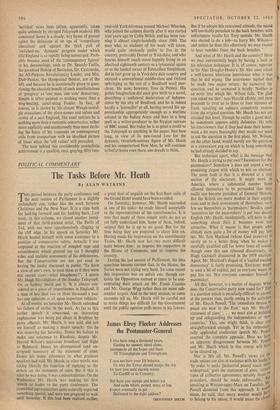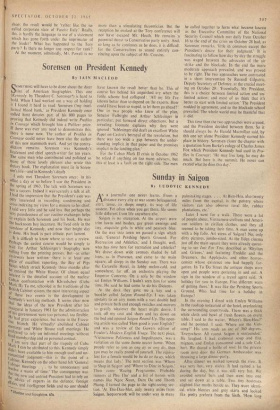POLITICAL COMMENTARY
The Tasks Before Mr. Heath
By ALAN WATKINS Tins period between the party conference and the next' session of Parliament is a- slightly melancholy one, rather like the week between Christmas and the New Year. It is a time both for looking forward and for looking back. Last week, in this column, we closed another instal- ment of that thrill-packed serial, The Perils of Ted, with our hero apprehensively clinging to the cliff edge. In his speech on Saturday Mr. Heath hauled himself with some assurance to a position of comparative safety. Actually I was surprised at the reaction of mingled rage and astonishment which greeted my (as I thought) sober and realistic assessment of his deficiencies. But the Conservatives are not yet used to having the leader discussed in public, `To have a view of one's own, to treat them as if they were not sacred cows—what blasphemy!': I quote Mr. Hugh Massingham of the Sunday Telegraph. Or, as Sydney Smith put it, 'It is always con- sidered as a piece of impertinence in England, if a man of less than two or three thousand a year has any opinions at all upon important subjects.' At all events, on Saturday Mr. Heath redeemed his failure of earlier in the week. As far as this earlier speech is concerned, an interesting explanation was being put about in Brighton by party officials. Mr. Heath, it was said, did not - see himself as making a major speech: this he was reserving for Saturday. Hence his failure to make any reference to Rhodesia, despite Mr. Harold Wilson's television broadcast and flight to Balmoral. Hence his disorganised (and un- scripted) summary of the statement of aims. Hence his many references to what previous speakers had said. Mr. Heath, in other words, was taking literally his function of replying to the debate on the statement of aims. But if this is what he was doing, it was a miscalculation. On the Wednesday Mr. Heath was making his first speech as leader to the party conference. The assembled representatives quite naturally expected something special, and were not prepared to wait until Saturday. If this had been realised earlier,
a great deal of anguish on the first-floor suite of the Grand Hotel would have been avoided.
On Saturday, however, Mr. Heath succeeded in one of his tasks—he made himself acceptable to the representatives of the constituencies. It is true that many of these simple souls do not as yet fully understand him. Some of them, indeed, suspect that he is up to no good. But for the time being they are prepared to cheer him on. Having made his impression on the constituency Tories, Mr. Heath now has two more difficult tasks before him : to impress his supporters in the House of Commons, and to impress the country.
During the last session of Parliament, the idea somehow became current that, in the House, the Tories were not trying very hard. To some extent this impression was an unfair one, though cer- tainly the Opposition seemed at times to be con- centrating their attack on Mr. Frank Cousins and Mr. George Wigg rather than on more sub- stantial targets. And in the next session, so some accounts tell us, Mr. Heath will be careful not to make things too difficult for the Government until the public opinion polls move in his favour. But if he adopts this restrained attitude, the mood will inevitably percolate to the back benches, with unfortunate results for Tory morale. Mr. Heath was elected to do a job—to harry Mr. Wilson— and unless he does this effectively we may expect to hear rumbles from the back benches. ` And what of Mr. Heath and the country? Here we may conveniently begin by having a look at his television technique. It is, of course, superior to Sir Alec Douglas-Home's. Sir Alec once asked a well-known television interviewer what it was that he did wrong. The interviewer replied that he made two major errors: he answered the question, and he answered it briefly. Neither is an error into which Mr. Wilson falls. 'I'm glad you asked me that,' says Harold affably, and then proceeds to treat us to three or four minutes of frank speaking on subjects completely remote from the original question. Mr. Heath has not yet attained this level. Though he smiles a good deal, he sometimes appears oddly defensive. He tells his interviewers that if they had done their home- work a bit more thoroughly they would not need to ask the question in the first place. Mr. Wilson, on the other hand, would merely use the question as a convenient peg on which to hang something he had already decided to say.
But technique apart, what is the message that Mr. Heath is trying to put over? Incentives for the pacemakers? Somehow it does not sound a very promising slogan with which to win an election. The main fault is that it is directed at a tiny section of the electorate. It might work in America, where a substantial number have allowed themselves to be persuaded that they really can become president of General Motors. But the British are more modest in their aspira- tions and in their, ,assessments of themselves; vcrY few see themselves as 'pacemakers.' Besides, once 'incentives for the pacemakers' is put into decent English (Mr. Heath, incidentially, will have to do something about this) it' becomes even less attractive. What it means is that people who already earn quite a lot of money will pay less tax. Mr. Iain Macleod (whom God preserve) is surely on to a better thing when he makes a carefully qualified call for lower taxes all round, though even this can rebound disastrously, as Hugh Gaitskell discovered in the 1959 election. Again, Mr. Macleod's slogan of a 'capital-owning democracy' is fairly promising. Everyone wants to own a bit of capital, just as everyone wants to pay less tax. Not everyone considers himself a pacemaker. All this, however, is a matter of slogans. Whitt does the Conservative party now stand for? This is a question which is peculiarly difficult to answer at the present time, partly owing to the activiuo of Mr. Enoch Powell. The immediate threats peace are now in the East,' says Mr. Heatii • statement of aims; . . we must aim at building up and safeguarding the independence of the'ii• countries.' This, one might think, is clear an,d straightforward enough. Yet in his enthusiasti- cally applauded conference speech Mr. Powell asserted the complete opposite. Here we hay; an apparent disagreement between Mr. Pox" and Mr. Heath which in due course will have to be cleared up. Nor is this all. Mr. Powell's views on the trade unions are also at variance with his leaders' 'In order to make [industrial peace] much ro.r, widespread,' goes the statement of aims, '...ert.11.,1' types of collective agreements, notably those tu; procedure, should be made enforceable.' 13,trj speaking at Weston-super-Mare on Tuesday, 1"1,1' Powell dissented from this approach. It w°13,0 mean, be said, that every worker would hard to belong to his union; it would mean the el°s'''
shop; the result would be 'rather like the so- called corporate state of Fascist Italy.' Really, this is hardly the language to use of a statement which has gone forth under the imprimatur of the leader! What has happened to the Tory party? Is there no longer any respect for rank?
At the moment, admittedly, Mr. Powell is no more than a stimulating theoretician. But the reception he evoked at the Tory conference will not have escaped Mr. Heath. He remains a potential threat to Conservative party unity. And, so long as he continues as he does, it is difficult for the Conservatives to sound entirely con- vincing upon the subject of Mr. Cousins.































 Previous page
Previous page